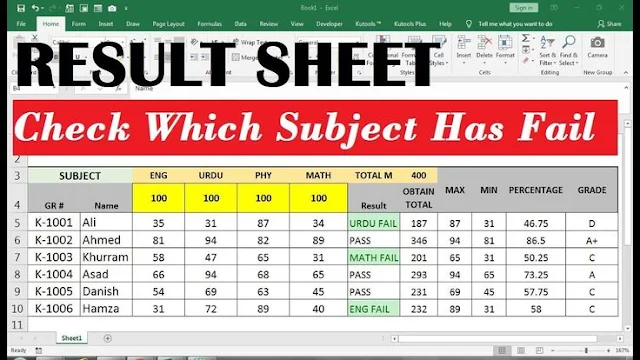BALVATIKA TO STD 8 RESULT FILE- EXCEL FORMAT
Assessment of Learning: Exams provide a way to assess students' understanding of the material covered in class. They help educators gauge how well students have absorbed the knowledge and skills taught during the instructional period.
Feedback for Improvement: Exams offer valuable feedback to both students and teachers. Students can identify areas where they need to improve and focus their efforts accordingly.
Teachers can also evaluate their teaching methods and adjust them to address students' weaknesses.Accountability: Exams contribute to accountability in education by providing a standardized measure of student performance. They help institutions, parents, and policymakers understand how well schools are educating students and whether improvements are needed.Preparation for Higher
Education and Career: Exams prepare students for higher education and future careers by promoting critical thinking, problem-solving, and time management skills. They also instill a sense of discipline and resilience necessary for academic and professional
success.Motivation: Exams can motivate students to study and strive for academic excellence. The challenge of performing well on exams encourages students to stay engaged with their coursework and set goals for themselves.
Benchmarking Progress: Exams serve as benchmarks to measure students' progress over time. By comparing performance on different exams, educators can track students' growth and development throughout the school year and across grade
levels.Standardization: Exams help maintain consistency and standardization in education by ensuring that all students are assessed using the same criteria. This allows for fair comparisons among students and across different schools or regions.
Preparation for Life Challenges: Exams simulate real-life challenges by testing students' ability to recall information, analyze problems, and apply their knowledge under pressure.
This prepares them to face similar challenges they may encounter in higher education, careers, or everyday life. Overall, school exams play a crucial role in the educational process by promoting learning, accountability, and personal growth among students.
Exams often serve as crucibles of mental endurance, challenging students to navigate a labyrinth of knowledge within a finite timeframe. The looming specter of exams can induce a profound sense of anxiety and dread, casting a shadow over weeks of preparation. The mental torture of exams stems from multifaceted pressures: the fear of failure, the weight of expectations, and the relentless pursuit of perfection.
પરિણામ બનાવવા માટે ઉપયોગી EXCEL ફાઈલ
As the exam day approaches, sleep becomes elusive, thoughts consumed by the relentless ticking of the clock. Minds buzz with a cacophony of formulas, theories, and historical dates, each vying for attention in a frantic race against time. Doubt creeps in, whispering insidiously of inadequacy and imminent disaster.
During the exam itself, every question becomes a battleground, each answer a strategic maneuver in a high-stakes game. Time becomes a merciless adversary, taunting with its swift passage as students struggle to capture elusive thoughts on paper. The pressure mounts, suffocating rational thought as panic threatens to overwhelm.
પરિણામ બનાવવા માટે ઉપયોગી EXCEL ફાઈલ (પત્રક C સાથે)
Even after the exam ends, the torture persists in the form of relentless self-evaluation. Every moment is spent dissecting responses, agonizing over potential mistakes, and replaying scenarios with haunting clarity. The mental toll of exams extends far beyond the confines of the examination hall, leaving an indelible mark on the psyche.
School exams are a quintessential aspect of the educational system, serving as both a measure of students' understanding and a means of evaluating their progress. These assessments come in various forms, ranging from standardized tests to essays, projects, and practical demonstrations of knowledge. While opinions on exams may vary, they undeniably play a crucial role in shaping academic experiences and preparing students for future endeavors.
One significant purpose of school exams is to gauge students' comprehension of the material covered in class. By testing their knowledge, educators can identify areas where students excel and topics that require further attention. This feedback loop allows teachers to adapt their instruction methods to better meet the needs of their students, fostering a more effective learning environment. Moreover, exams serve as a means of accountability for both students and educators. Students are prompted to engage actively with the material throughout the semester, knowing that they will be assessed on their understanding. This encourages regular study habits and reinforces the importance of consistent effort in academic pursuits. Likewise, teachers are held accountable for the effectiveness of their instruction, as exam results reflect not only students' understanding but also the quality of teaching provided.
ચુંટણી માટે તમામ ઉપયોગી મટેરિયલ માટે CLICK HERE
Beyond academic assessment, exams also help students develop essential skills such as critical thinking, problem-solving, and time management. The process of preparing for exams requires students to review and synthesize vast amounts of information, enhancing their ability to analyze complex concepts and draw meaningful conclusions. Additionally, exams often have time constraints, teaching students to prioritize tasks and allocate their time effectively—a skill applicable in various aspects of life beyond the classroom.
ધોરણ ૮ માટે વિદાય સ્પીચ અને શુભેચ્છા સંદેશ પ્રમાણપત્ર CLICK HERE
.gif)
Yet, amidst the anguish, there exists a glimmer of resilience. Each trial endured, each challenge overcome, fortifies the mind against future tribulations. And ultimately, it is this resilience that transforms the mental torture of exams into a crucible of growth and self-discovery.


Comments
Post a Comment